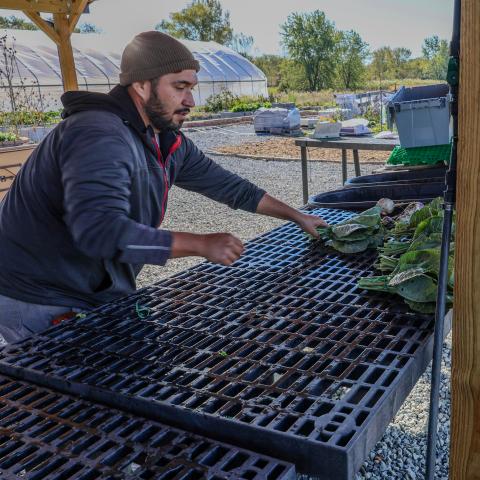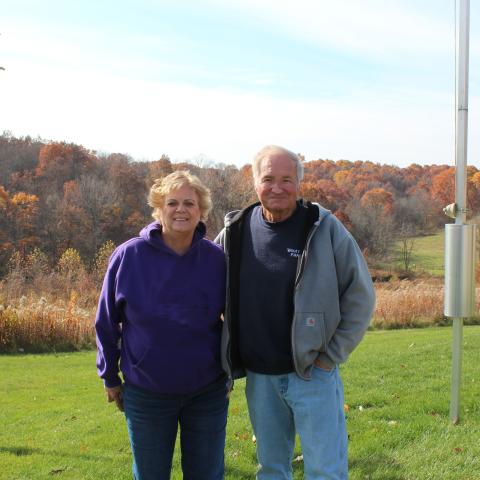Topics
Public Notices
2025 IL State Technical Committee Meetings Set
The State Technical Committee, which functions in an advisory capacity to the USDA Natural Resources Conservation Service on implementation of the Farm Bills and related technical and scientific issues, has set dates and locations for 2025 meetings. Individuals with conservation expertise are welcome to attend and participate. NRCS holds all meetings at the NRCS State Office, 2118 W. Park Ct., Champaign, IL 61821 unless otherwise posted. All meetings convene at 9:30 AM.
2025 Meeting Dates
March 6, 2025 Location: Farm Credit Office, 1100 Farm Credit Drive, Mahomet, IL 61853
July 17, 2025 Location: IL Soybean Association, 1108 Trinity Lane, Bloomington, IL 61704
November 6, 2025 Location: NRCS State Office, 2118 W. Park Ct., Champaign, IL 61821
If needed, other special meetings may be called. If you need to request special accommodations for accessibility, please contact AJ Ruggieri at il-nrcs-publicinfo@usda.gov or (217) 353-6668.
Publications
If you want to access a list of brochures translated into other languages, visit https://www.farmers.gov/translations.
Easements
Erosion
Forestry
Organic
Pollinator
Programs
RCPP
Urban Agriculture
Archive-Small Scale Solutions
These small farm solutions fact sheets offer a general understanding of NRCS technical services and implementation of conservation practices or management concepts. The factsheets are introductory in nature and should not be used to implement conservation practices or management concepts without technical support.
Farmers, ranchers and forest landowners are encouraged to seek NRCS technical assistance to develop a conservation plan that fits the management needs of their operations.
- Abandoned Well Plugging: a plugged well is no longer dangerous as an open hole to people, animals, and farm machinery.
- Ag Chemical Handling Facility: A farm chemical mixing or handling area is a place where chemicals are mixed or a field sprayer is filled so that any spills do not soak into the ground.
- Alley Cropping: Plant crops between tree rows to generate annual income and diversify your operation.
- Animal Mortality Disposal: An animal mortality disposal facility is a safe method to dispose of dead livestock. Typical methods include composting, incineration, rendering, and burial.
- Balancing Animals with Forage: Increase pasture longevity by understanding your forage-animal balance.
- Biological Pest Management: Better control insects and disease with natural alternatives for your lands and structures.
- Composting Manure: Composting is well suited for manure that contains a lot of bedding material, such as straw, sawdust, wood shavings, or spilled hay.
- Cover Crops: Utilize planting grasses and legumes to combat crusting soils, soil erosion, weeds and more.
- Farmstead Windbreaks: Reduce heating cost and provide a natural barrier for weather events and debris.
- Fencing: Better manage and protect your resources by strategically limiting access from animals and people.
- Forage Planting: Provide weed management, increase livestock feed, poor yields and lack of legumes.
- Forest Farming: Diversify your land and make your land more profitable.
- Fuel and Fire Breaks: Increase protection of your property and resources from the hazards of wildfire.
- Grade Stabilization: Grade stabilization is installed to stop a gully at the edge of a field. It is usually installed with a grassed waterway that brings water to the structure.
- Heavy Use Area Protection: A heavy use area is protected by first removing all the mud and muck, then replacing it with something that will last for a long time such as gravel or clam shells.
- Irrigation Water Management: Irrigation water management is a plan to help you know when, how much, and at what rate to apply irrigation water in an efficient manner.
- Low-Cost Irrigation System: A low-cost irrigation system can be as simple as a series of troughs or gutters moving water by gravity.
- Managing Manure Nutrients - Central: Managing nutrients in manure means taking advantage of the nutrients, so you buy less fertilizer and improve soil and water quality.
- Managing Natural Vegetation - Early Successional Habitat Management: “Early successional” plants are those that first grow on an area following a disturbance, such as a fire. Managing these plants that grow naturally on your farm can provide habitat for common wildlife species such as deer, rabbits, quail, turkey, doves, and songbirds.
- Manure Storage: Storage makes it easier to get manure in the right place at the right time to improve the quality of your soil and the health of your crops.
- Native Pollinators: Improve crop production and quality with the help of native pollinators.
- Odor Control: Reduce unwanted smell or manure visibility of livestock operations.
- Pruning: Remove tree overgrowth to decrease fire hazard and increase production of vegetation.
- Rotations for Livestock Feed: Implement crop rotations to address livestock feed needs and reduce costs.
- Rotations for Soil Fertility: Implement crop rotations to address soil issues and improve crop yields.
- Runoff Management: Helps reduce water running off land around a livestock farm that can be polluted with manure and mud impacting streams and lakes.
- Selecting an Irrigation System: It is very important that increased yield and better crop quality will result in sufficient increase in income to offset the cost of installing and operating the irrigation system.
- Silvopasture: Take advantage of tree, forage and livestock production on the same acreage at the same time.
- Small Woodlot Improvement: Address overcrowded woodlands to reduce wildfire risk and improve productivity.
- Soil Health: Increase plant health and decrease soil issues like erosion and runoff.
- Soil Testing: Identify production problems related to nutrient deficiencies or imbalances.
- Sources of Water: Before you buy and install an irrigation system you must find a source of water and determine the rate (quantity) and quality of the water.
- Spring Development: Even a small spring flowing all the time can provide a lot of water.
- Stream Crossing: A stream crossing provides a hard, stable area where livestock or equipment can cross a stream without damaging the streambed or banks.
- Vegetative Barrier: Utilize perennial plants to address gully erosion in fields.
- Watering Facility: A watering facility can be a permanent or portable watering trough or a device like a nose pump that lets cows pump water from a stream or pond.
For current updates, please search for Illinois news in the top banner. Below is an archive of our previous news and success stories.
News Releases
May 2023
Illinois NRCS Announces Organic Transition Initiative Signup
USDA Opens Full-Time, Entry-Level Soil Conservationist Positions in Illinois
February 2023
New Wetland Easement Pay Rates for 2023
Inflation Reduction Act Funding for Climate-Smart Agriculture in Illinois
January 2023
IL NRCS Announces 2023 RCPP Application Cutoff Date: Kinkaid Lake Restoration Project
IL NRCS Announces 2023 RCPP Application Cutoff Date: Southern Illinois Oak Ecosystem Restorations
IL NRCS Announces 2023 RCPP Application Cutoff Date for Precision Conservation Management
Submit Illinois CSP Applications for 2023
NRCS Announces Application Cutoff for Special Conservation Projects in Marshall-Putnam Counties
2022
2023 EQIP Application Cutoff Date Set for IL Headwaters Conservation Partnership
2023 EQIP Application Cutoff Date for Otter Lake Source Water Protection Project
2023 Application Deadline Set for IL EQIP Landscape Initiatives
EQIP Application Cutoff Date Set for NW Illinois Driftless Area
Illinois EQIP 2023 Application Deadline Established
NRCS: 2023 RCPP Application Cutoff Date for Working Lands, Water, and Wildlife Partnership
Wetland Reserve Easement Sign Up for FY 2023
Ag Land Conservation Easements with NRCS & Entities
USDA Boosts Conservation on Grazing Lands and Support for Farmers and Grazers
USDA to Invest $5 Million in in Wetland Mitigation Banking Program
USDA and the Urban Transformation Network help feed Chicago with a new People’s Garden
USDA Increases Funding for Partnerships to Safeguard, Restore Wetland Ecosystems
Illinois Farmers Mailed Surveys to Get Information on Conservation Practice Use
MEDIA ADVISORY - Chicago's People Garden Kick-Off
Take Conservation Action for Bobwhite Quail
Illinois Grazing Specialist Receives National Conservation Award
Success Stories
Soil Health
'Bout Broke Farm - Rich in Conservation
WANTED: Open-Minded Farmer for Organic-Minded Landlord
A Sustainable, Diverse Operation
Doing His Part to Make A Difference
Farm Improvements Help Local Water Supply
If I can do it here, you can do it anywhere
A Different Kind of Farm Expansion
Cover Crops
Farming With Conservation In Mind
Grazier Profiles
Wetlands
A New Kind of “Absentee” Landowner
Ducks Misery – A Wetland for the Ages
Nutrient Management
Carrying the Conservation Torch
Urban Agriculture
Sharing the Tomato-A People's Garden Success Story
People's Garden in Illinois Provides Food, Sanctuary for Pollinators
Great Lakes Restoration Initiative
Great Lakes Restoration Initiative
Great Lakes Restoration Initiative-Update
Earth Team
Planting Seeds in Mercer County
Earth Team Volunteers Dive “All In”!
Meet Earth Team Volunteer Hannah
Meet Earth Team Volunteer Elizabeth
Meet Earth Team Volunteer Katelynn
Other
Livestock Operations-The Ultimate Recycling Story
Emergency Watershed Protection Program Success




